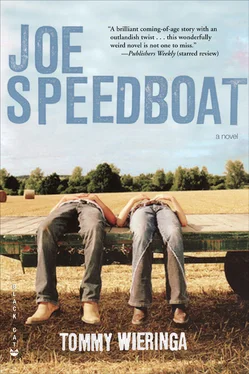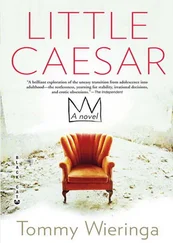‘Hello, Frankie,’ P.J. said when I came outside. ‘Sorry if we gave you a fright.’
It was the first time she’d ever spoken directly to me. I saw Ma looking out the living-room window and waved to her. When she appeared at the kitchen door I made a drinking gesture. She said hello to Joe and introduced herself to P.J., ‘but I’ve seen you before, of course’. They were an unlikely contrast, this worldly girl and Ma, that rough monument of care and industry. Although they seemed to speak the same language, I was sure that if you sat them down for an hour at the kitchen table together an abrupt end would come to the vocabulary they both understood, they would reach the outer limits of the things both of them could imagine.
I repeated the drinking gesture.
‘Would you like some coffee, or tea? Or something else? Something cold? Both coffee? I’ll just make a little then, it will be done in a jiffy, no, no problem at all. Cream, sugar? Both black? Well, that should be easy to remember.’
I felt like scratching, my back was itching badly, aggravated by Ma’s blank inertia and the cross-examination that had to go before a plain old cup of coffee. P.J. asked me a jumble of questions about producing briquettes, the answers to which I wrote on my notepad without meeting her eye.
‘You have nice handwriting,’ P.J. said as Ma brought the coffee.
‘He writes everything down,’ Ma hastened to say. ‘You name it. He sits there writing all day long. Frankie, come on, show the young lady your books! His whole wall is covered in them.’
I hissed at her like a cornered serpent, but P.J.’s curiosity had been aroused.
‘That’s pretty special,’ she said, ‘a guy who keeps a diary.’
Ma, who had backed off to the kitchen door, nodded and wrung her hands in that way of hers that made me feel bad about myself. P.J. asked if she could see the diaries. I led her into the house and pointed to them.
‘Are these the ones?’ she asked.
Her finger, the same one with which she had scared the daylights out of Mousetown, slid across the bindings of ninety-two chronologically arranged hardback notebooks, for which I was the sole customer at Praamstra’s bookshop. She turned to face me.
‘I don’t suppose I could. .?’
I shook my head.
‘I didn’t think so.’
She knelt down beside the shelf containing the earliest years and sighed.
‘What’s in them — I mean, is it all personal or is it also about the outside world?’
I made a sound of assent.
‘Both?’
I nodded. She stood up.
‘My boyfriend, did you know that he’s a writer? I bet Joe told you. Arthur would love this. Oh, Frankie, can’t I look at just one page, please?’
There was a predatory glimmer in her eyes. She was warming me up to dangerous heights. I knew that nothing would be impossible for her, no one can resist beauty with a will. I pulled out a notebook at random, laid it on my lap and flipped through it until I found an innocuous passage: lots of Joe, the start of winter and a difficult day at school. I handed it to her. She sighed again.
‘It’s beautiful,’ she said after a while, ‘really beautiful. Your handwriting, so much. . orderliness, and a whole bookcase full of it. I’ve never seen anything like it, this has to be the book of everything. That you, I mean who would have thought, that you just write and write, that you see everything but don’t say a thing.’
Definition of God , I scribbled, and for the first time tasted the delight of her laugh. She closed the book and put it back between the other two.
‘And what about me, is there anything in there about me?’
What could I say? If I confirmed it she would want to know what I had written about her, if I denied it I would be denying my love and disappointing her. A spasm came and ebbed away, I wrote:
The facts
arrival in Lomark 1993
grade-point average: 8.4
Jopie K.
‘You looked at my grades! But, by the way: it was an eight point five.’
I shook my head, made a column with her final marks, averaged them and came up with 8.4. (Yes, she was impressed.)
Ma watched from the window as we pulled away. I was sitting up front in my own cart, P.J. sat on a blanket in the back because there was no seat there, only the rails they’d used to slide the coffins in and out.
‘Your mother’s so sweet,’ she said.
We picked up Engel and drove out of Lomark. Combines were bringing in grain from the fields, swarms of gulls followed the machines like a fleet of fishing boats. Light-yellow wisps of dust hung in the air.
P.J. asked Joe to open the back window (electric), then stuck her bare feet outside. She lay on her back, resting her head on her arms, her sweater had slid up and left her tummy bare. I saw the shape of her breasts. Engel was listening to Joe’s theory about Papa Africa’s odyssey. The hypotheses had now been further refined: on the Internet Joe had looked at the weather maps and traced his stepfather’s possible route. There had been no major storms in August or September of last year.
For the duration of that drive I was dazed by the recurring sense that something good was about to happen. I rolled down the window a little, the earth smelled of hot dust and grass. Engel talked louder above the wind.
Somewhere in the course of that slow, fluid day we got to his house in Enschede, in a working-class neighbourhood built entirely of red brick. Fat people were sitting on the stoop in garden chairs, unreal numbers of washed-out children were slurping at soft drinks.
‘Welcome to the barbecue barrio,’ Engel grinned. ‘The grease pit for all your super-discount shopping needs.’
P.J. was horrified.
‘Haven’t they ever heard of calories around here?’
A neighbour raised a swing-top bottle of Grolsch in greeting, I could see the wet plucks of hair in his armpit.
‘Hey, Engel, them’s friends a yurn? Take a load off, mister, join us f’r a wee Pilsner.’
Engel lived on the second floor, when he opened the doors to the balcony we saw back gardens full of plastic furniture and obnoxious piles of toys.
There was a half-litre of supermarket rosé in the cupboard, but no straw. Engel poured it into teacups. P.J. said, ‘Come on, let me help with that’ and held the cup to my lips like a mother. I drank and looked greedily, she was so close that over the edge of the cup I could see the light summer freckles on the bridge of her nose. I drank it all at one go.
‘Boy,’ she said.
‘It’s medicinal,’ Joe explained, ‘it keeps him from shaking. I bet you’d like another one, wouldn’t you, Frankie?’
I grinned.
‘Well, you heard the man.’
There was an unmistakable rumble of thunder in the distance, and Joe began collecting his things. A sleeping bag, his father’s knapsack, a folder with sketches and two clay sculptures representing machines you’d expect to see on a building site.
‘Your pans,’ Engel said, ‘don’t forget your pans.’
Joe put everything in the car and said we had to get going.
‘We need to be home by dark, the headlights don’t work yet.’
P.J. tossed the last glass of rosé down my gullet, the way she cared for me did me good. Engel was staying in Enschede and waved to us as we drove off. The thunder and lightning were close now, the sky above the city had turned to mica. Engel waved until we turned the corner. It was the last time I saw him alive.
The next weekend Joe came by to pick me up on his way to the junkyard: he needed parts for the hearse’s cooling and electrical system. With a sort of dramatic affirmation I realized that this was the first time I’d been to the yard since the accident. The operating capacity had grown by 50 percent in the last couple of years, there was a new press for car wrecks, and the waste-separation methods had become more sophisticated. That might sound high-tech, but the basic business was the same as ever: wrecks and old junk. Still, it wasn’t the kind of bidonville you might expect; all the waste was separated and the used oil was neatly collected and disposed of. ISO 9000 certification, Hermans & Sons, let there be no mistake about that. I always thought that was funny, that Pa wanted to have the kind of proper junkyard that people would feel good about coming to, like a slaughterhouse without the bloodstains.
Читать дальше












